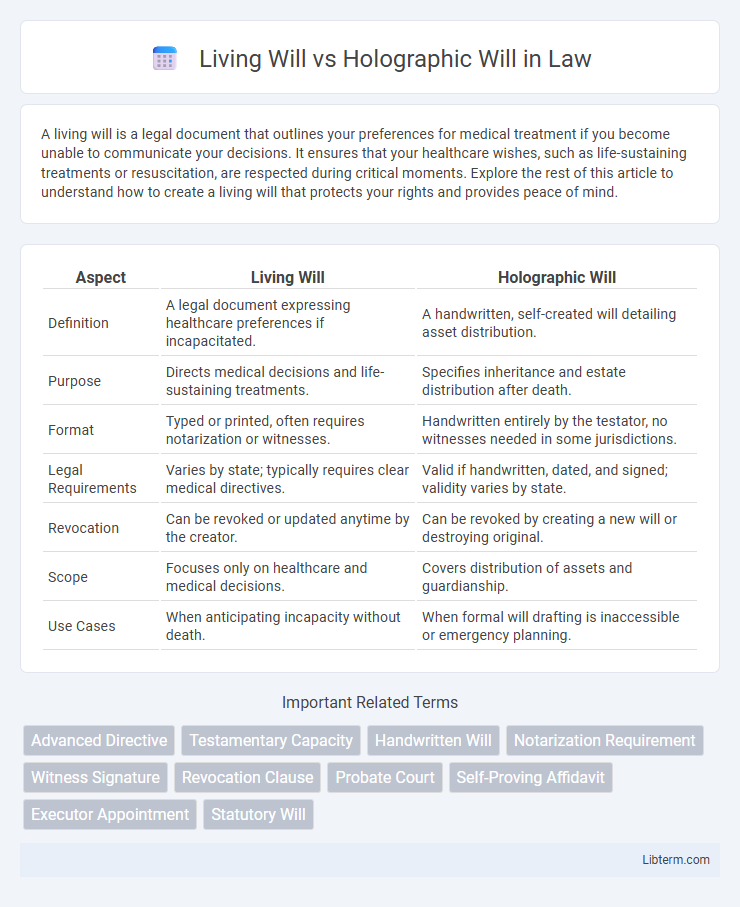A living will is a legal document that outlines your preferences for medical treatment if you become unable to communicate your decisions. It ensures that your healthcare wishes, such as life-sustaining treatments or resuscitation, are respected during critical moments. Explore the rest of this article to understand how to create a living will that protects your rights and provides peace of mind.
Table of Comparison
| Aspect | Living Will | Holographic Will |
|---|---|---|
| Definition | A legal document expressing healthcare preferences if incapacitated. | A handwritten, self-created will detailing asset distribution. |
| Purpose | Directs medical decisions and life-sustaining treatments. | Specifies inheritance and estate distribution after death. |
| Format | Typed or printed, often requires notarization or witnesses. | Handwritten entirely by the testator, no witnesses needed in some jurisdictions. |
| Legal Requirements | Varies by state; typically requires clear medical directives. | Valid if handwritten, dated, and signed; validity varies by state. |
| Revocation | Can be revoked or updated anytime by the creator. | Can be revoked by creating a new will or destroying original. |
| Scope | Focuses only on healthcare and medical decisions. | Covers distribution of assets and guardianship. |
| Use Cases | When anticipating incapacity without death. | When formal will drafting is inaccessible or emergency planning. |
Introduction to Living Wills and Holographic Wills
Living Wills are legal documents outlining a person's medical treatment preferences if they become incapacitated, ensuring their healthcare wishes are respected. Holographic Wills are handwritten, unwitnessed testaments that express an individual's final wishes, which some jurisdictions recognize as valid. Understanding the distinctions between Living Wills and Holographic Wills is crucial for effective estate and healthcare planning.
Defining a Living Will
A living will is a legal document that specifies an individual's preferences for medical treatment in situations where they become incapacitated and unable to communicate their wishes. It primarily addresses end-of-life care decisions, such as life support, resuscitation, and pain management. Unlike a holographic will, which deals with the distribution of assets, a living will guides healthcare providers and family members on medical interventions.
Defining a Holographic Will
A holographic will is a handwritten and unwitnessed document that expresses a person's wishes regarding the distribution of their estate after death. Unlike a living will, which outlines healthcare directives, a holographic will specifically addresses inheritance and asset management upon the testator's death. Many jurisdictions require that a holographic will be signed and dated by the testator for it to be considered legally valid.
Key Differences Between Living Will and Holographic Will
A Living Will is a legal document outlining medical care preferences if a person becomes incapacitated, while a Holographic Will is a handwritten, unwitnessed testament dictating asset distribution after death. Living Wills focus on healthcare decisions and are effective during a person's lifetime, whereas Holographic Wills are concerned exclusively with estate planning and take effect upon death. The enforceability of a Living Will depends on specific state laws governing advance directives, whereas Holographic Wills may face challenges in probate due to their informal nature and lack of witnesses.
Legal Requirements for Living Wills
Living wills require strict adherence to legal standards, including written documentation, clear expression of healthcare preferences, and often witness signatures or notarization, varying by state laws. These documents must explicitly state the individual's medical treatment wishes to be legally enforceable, ensuring healthcare providers honor the directives during incapacitation. Unlike holographic wills, which can be handwritten and less formal, living wills emphasize precise legal criteria to validate healthcare instructions.
Legal Requirements for Holographic Wills
Holographic wills require strict legal criteria, including being entirely handwritten and signed by the testator to ensure validity. Several jurisdictions mandate the presence of witnesses or explicit attestations, though some accept unwitnessed holographic wills if handwriting and signature authenticity are verifiable. Courts often scrutinize holographic wills for clarity and intent, emphasizing the testator's capacity and absence of undue influence under local probate statutes.
Pros and Cons of Living Wills
Living wills provide clear instructions regarding medical treatments and end-of-life care, ensuring patients' wishes are honored when they cannot communicate. They offer legal protection by reducing family conflicts and guiding healthcare providers, but their limitations include inflexibility in unforeseen medical situations and potential challenges if not properly drafted or witnessed. Unlike holographic wills, which address the distribution of assets, living wills specifically focus on healthcare decisions, making them essential for proactive medical planning.
Pros and Cons of Holographic Wills
Holographic wills offer the advantage of simplicity, as they are handwritten and often do not require witnesses, making them accessible to individuals without legal assistance. However, their informal nature can lead to challenges in proving authenticity and may result in disputes or invalidation due to unclear language or missing signatures. The lack of standardized formatting in holographic wills increases the risk of legal complications compared to formally drafted wills like living wills.
Choosing the Right Will for Your Needs
Choosing the right will depends on your specific needs and legal circumstances; a living will primarily addresses healthcare decisions and end-of-life wishes, while a holographic will is a handwritten document outlining asset distribution without formal legal requirements. Living wills must comply with state laws and often require witnesses or notarization to be valid, ensuring your medical preferences are honored. Holographic wills, though easier to create, may face challenges in probate due to lack of formalities, making them suitable only for simple estates or emergency situations.
Frequently Asked Questions About Living and Holographic Wills
Living wills specify medical treatment preferences in case of incapacitation, guiding healthcare providers during critical decisions. Holographic wills are handwritten documents dictating asset distribution and require validation through signatures and witnesses based on jurisdiction. Common questions address differences in legal requirements, enforceability, revocation processes, and situations where each will type is most appropriate.
Living Will Infographic

 libterm.com
libterm.com